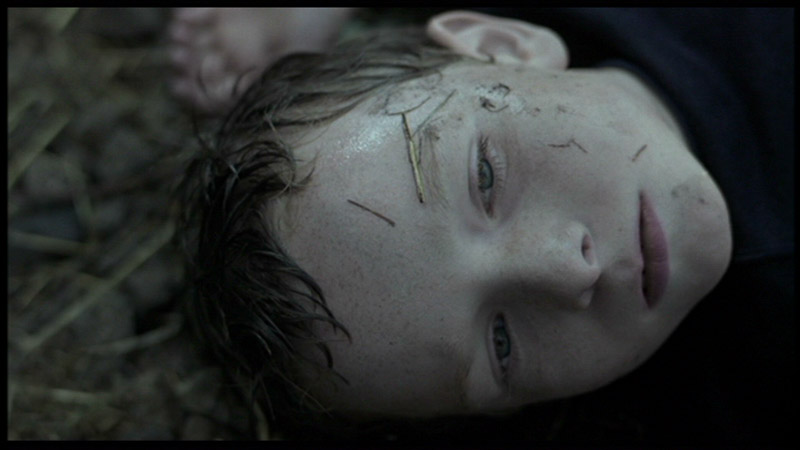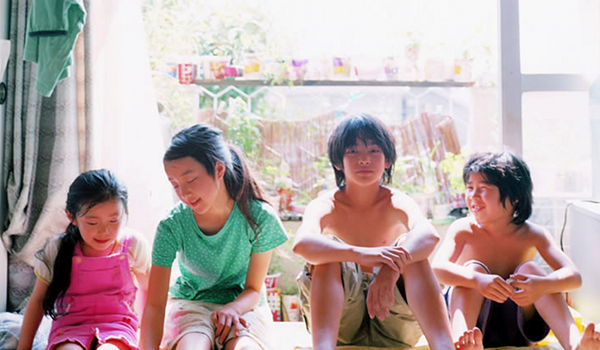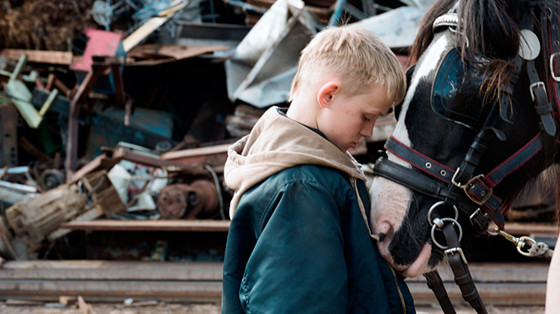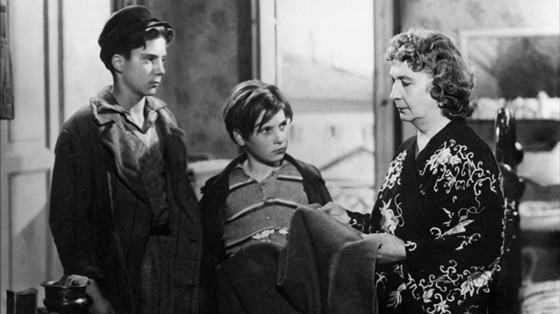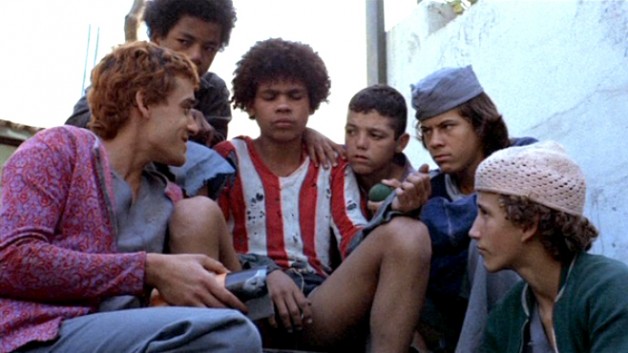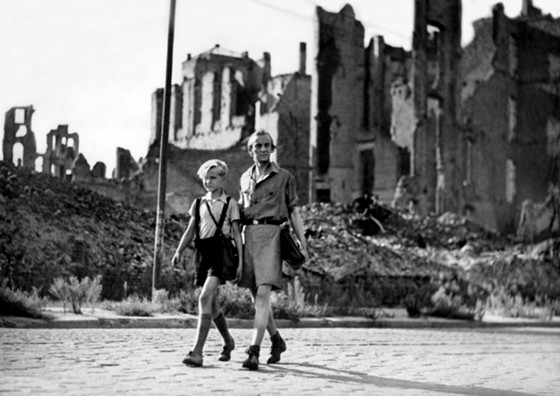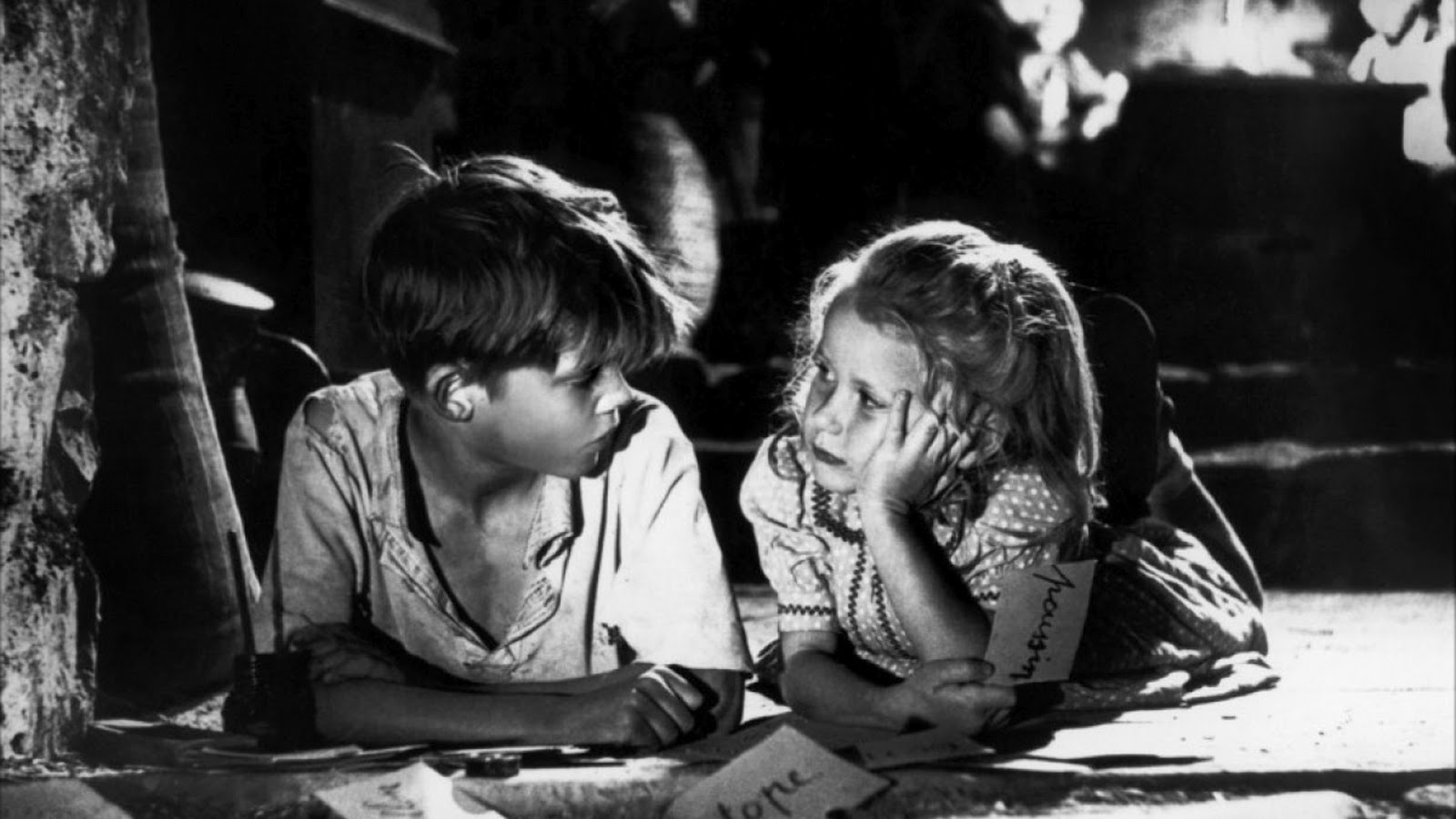14. Ratcatcher (Lynne Ramsay, 1999)
Written and directed by Lynne Ramsay, Ratcatcher was her 1999 feature film debut and starred William Eadie as the 12-year-old central character James.
Set in Glasgow in 1973, Ratcher follows James as he lives in squalor with his family whilst they await being relocated to better housing by the government. The garbage men have gone on strike for weeks and as a result the neighbourhood is being overrun by waste, creating a serious health hazard.
Surrounded by filth, dysfunctional family and neighbours and having caused the drowning death of another boy his age without having told anything about his involvement, James is beset from all sides by an extremely bleak reality and tries to cope to the best of his 12-year-old abilities.
An extremely grim realist kitchen-sink drama, Ratcatcher can be another hard film to watch but has an undeniable impact. Seen through the eyes of a 12-year-old, the film manages to have its moments of almost poetic beauty amongst the squalor as James longs for a brighter life.
With a muted colour palette and great performances all round, Ratcatcher is an extremely assured and unique debut. As a result Lynne Ramsay won a string of awards for Best Director and Best Newcomer, amongst them various BAFTA, British Film Institute, British Independent Film and London Critics Circle Film Awards.
13. Nobody Knows (Hirokazu Koreeda, 2004)
Inspired by a real-life event known as the “Sugamo child abandonment case” in Japan, Nobody Knows is a 2004 drama written and directed by Hirokazu Koreeda and starring Yūya Yagira.
Keiko (You) is a single mother with four children who have all been fathered by different men. She has just moved into a new apartment with them but the landlord is only aware of one of her children, the 12-year-old Akira (Yuya Yagira). The other three, 10-year-old Kyoko (Ayu Kitaura), 7-year-old Shigeru (Hiei Kimura) and 4-year-old Yuki (Momoko Shimizu) are therefore hidden and not allowed to leave the apartment at any time.
Then one day Akira finds a note from his mother which informs him she will be gone for a while and that he’ll be in charge of his siblings till then. Along with the note, Keiko leaves some money but disappears for months, leaving the kids to fend for themselves. She briefly returns at some stage, saying that she is about to get married and that the kids will lead a normal life soon but leaves again and is never seen or heard from again.
As time progresses, it becomes harder and harder for Akira and his siblings to take care of themselves and to keep their situation a secret.
Whilst based on a infamous real-life incident of abandoned children in Japan, Nobody Knows is not a factual retelling of that case and shockingly is far less horrendous than the actual event. A beautiful, humane and completely engrossing drama about the resourcefulness and ultimate impossibility of young children to make it on their own, the film is a wonderfully directed naturalistic tragedy with some stunning performances from its young cast.
Nobody Knows won Best Film and Director at the Blue Ribbon Awards, Best Film, Supporting Actress and New Actor at the Kinema Junpo Awards, Best Film at the Hochi Film Awards and Yûya Yagira won Best Actor at the Cannes Film Festival where the movie was also in the running for the Palme d’Or.
12. The Selfish Giant (Clio Barnard, 2013)
Inspired by the story of the same name by Oscar Wilde, The Selfish Giant is a bleak British drama directed by Clio Barnard.
13-year-old Arbor (Conner Chapman) and his best friend Swifty (Shaun Thomas) are both outsiders at school with difficult situations at home. Arbor lives with his mother and addicted older brother whilst Swifty tries to help out his large family, lead by a father who is constantly getting them into deeper financial trouble. The two decide that they are better off doing shady business for the local scrap-metal dealer Kitten (Sean Gilder) than going to school.
And whilst it’s Arbor who is trying hardest to impress Kitten by supplying him with all sorts of illegally obtained metal, it is Swifty he takes in interest in due to his kind-hearted nature and love for horses, something which the shady scrap dealer can to use to his advantage. This sets the stage for the friends drifting apart with tragic consequences.
A bleak British working-class drama, The Selfish Giant is the feature film debut of director Clio Barnard, who displays clear command of her material. Powerful and austere, the film also benefits from great performances all round with young Conner Chapman and Shaun Thomas being especially impressive in the lead roles.
Reminiscent of other British social dramas by Ken Loach and Andrea Arnold, who had an entry earlier on this list, the film won the Europa Cinemas Award at Cannes, Best British Film and Young British Performer at the London Critics Circle Awards and was nominated for seven BAFTA Awards, winning one for Best Casting.
11. Shoeshine (Vittorio De Sica, 1946)
One of the seminal films of the Italian neorealist movement, Shoeshine (Sciuscia – the Italian pronunciation of the English word) is a 1946 drama directed by Vittorio De Sica.
The film deals with Italian street children in Rome just after the end of World War II, focusing on the two friends Giuseppe (Rinaldo Smerdoni) and Pasquale (Franco Interlenghi). The boys are obsessed with horses and dream of owning one, saving money from the work they do as shoeshiners.
When Giuseppe’s older brother involves them in a black market scheme, the boys make enough money to finally buy a horse but soon after they do, the police catches up with them and they are sent to a reformatory. Inside, the boys are separated and slowly torn apart under the influence of other inmates.
Once again working with children and non-professional actors (as he also did in The Children Are Watching Us and would do again in Bicycle Thieves), Vittorio De Sica created another neorealist masterpiece dealing with social issues in the wake of WWII.
The film didn’t do well in Italy, where the audience wanted escapism instead of the bleakness on display here, but became a hit worldwide in the wake of Roberto Rossellini’s Rome, Open City, which left audiences worldwide wanting more from this new film movement from Italy. Shoeshine received an Honorary Award at the Academy Awards for its high quality as well as a nomination for Best Screenplay.
10. Pixote (Hector Babenco, 1981)
Based on the book A Infância dos Mortos (The Childhood of the Dead Ones) by José Louzeiro, Pixote (original title “Pixote: A Lei do Mais Fraco” which roughly translates to “Pee Wee: The Law of the Weakest”) is a stark realistic drama about the street children in Brazil’s favelas.
Pixote is a young boy living on the streets of Rio de Janeiro. He is rounded up by police and sent to a juvenile reformatory. But the reformatory, which is ran by corrupt and sadistic guards and where rape and drug abuse are the order of the day, is even worse than living on the streets.
After two of the boys die in the reform school as a result of abuse, Pixote and two others escape and make their way to Rio where they start selling drugs and meet an older prostitute. They become her pimps and decide that robbing her customers is an additional way to make money but when a hold-up goes horribly wrong and Pixote gets rejected by the prostitute who he tries to see as a mother figure, the boy takes off alone to the streets again.
Reminiscent of Luis Buñuel’s Los Olvidados in its harsh documentary-like depiction of the life of street kids in the slums, Pixote is a drama filled with poetic realism evoking the films from the Italian neorealist period. Director Hector Babenco manages to couch some incredible performances from his young cast, especially from Fernando Ramos da Silva, who actually came from the streets and was killed by Brazilian police six years after the release of the movie.
The film was nominated for a Golden Globe for Best Foreign Film and won the same award at the Los Angeles, Boston and New York Film Critics Awards.
9. Germany Year Zero (Roberto Rossellini, 1948)
The third film in Roberto Rossellini’s unofficial war film trilogy, Germany Year Zero differs from the previous two films in that it’s set in Berlin (as opposed to Italy) and that the film was not strictly shot on location like his previous efforts.
The film follows 12-year-old Edmund Koehler, who lives in the ruins of Berlin, one year after the end of the war. He lives with his large family in a small apartment and the family is struggling in many ways. His father is seriously ill, his brother doesn’t have a ration card as he has not registered with the police because he’s afraid he will be arrested for having fought for Germany until the very end of the war and his sister is dating American soldiers for cigarettes and other favours.
Edmund does what he can to help his family survive and starts selling whatever he can find on the black market. But when he meets a former teacher of his, who clearly still has Nazi sympathies, some of the man’s ideas have a devastating effect on the young Edmund.
Still shot with local non-professional actors, Germany Year Zero differs from Rossellini’s earlier work in that it’s more melodramatic, largely shot in a studio and that the story takes place just after the war instead of during it. Whilst it was met with criticism at the time of its release for differing from his previous work, the film has gained in stature over the years.
A harrowing account of the after effects of war on a child, Germany Year Zero is a stark and pessimistic work, which wasn’t shown in Germany till many years later. The film won the Grand Prix as well as an award for Best Screenplay at the Locarno Film Festival in 1948.
8. Forbidden Games (René Clément, 1952)
Based on the novel of the same name by François Boyer, Forbidden Games is a childhood drama set during World War II directed by René Clément and starring Georges Poujouly and Brigitte Fossey.
Paulette (Fossey) is a five-year-old girl who’s orphaned when her parents and dog are killed during an air raid as they are fleeing from Paris at the start of World War II. Walking around the countryside, carrying her dead dog, she is found by Michel Dolle (Pujouly), who brings her home to his peasant family who decide to take the girl in.
The two soon become best of friends and decide to bury Paulette’s little dog in a nearby abandoned mill. Fearing that the dog will be lonely, they start burying all sorts of animals there but when they start stealing crosses from the local cemetery to erect over the animal graves, they get themselves into serious trouble.
One of the first films to depict the experience of war through the eyes of a child, Forbidden Games is an unsentimental yet heartbreaking look at how they experience and deal with the ravages of all the carnage and death surrounding them. Adults aren’t depicted in a very generous light and the film wasn’t a success in France upon its initial release.
Internationally however, it did very well and the film won the Golden Lion at the Venice Film Festival, an Honorary Award at the Academy Awards and a BAFTA Award for Best Film from any Source. An anti-war classic and arguably René Clément’s only true masterpiece.
